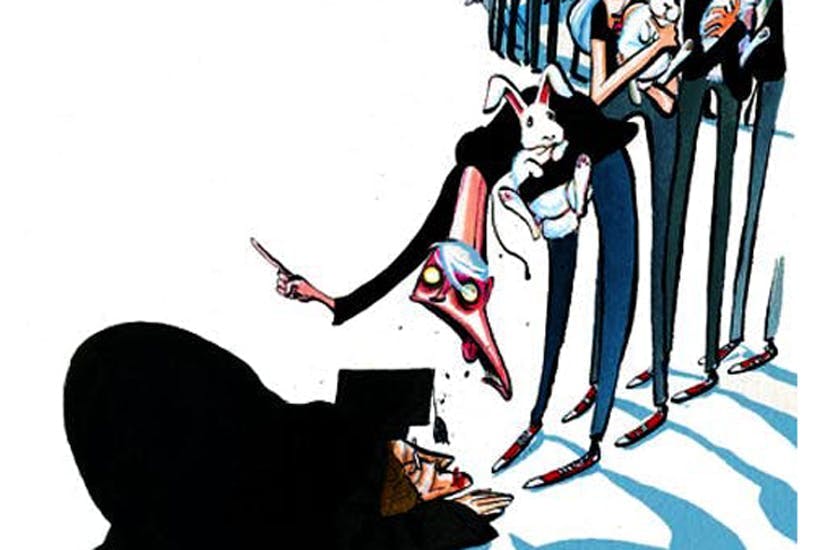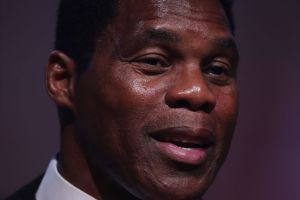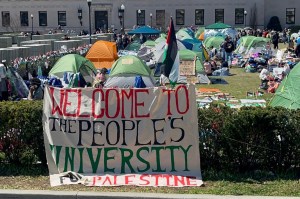A part-time lecturer and friend of mine was reported to his university last month for making ‘inappropriate comments’ in the teacher’s room. These comments, related to his skeptical views on man-made climate change. The accuser, another part-time lecturer irate at such heresy, clearly wanted my friend to be sacked. Had this been a British or American university, I would have gravely worried about my friend’s position. Luckily for him, it happened in Tokyo. So his job is safe.
Why? I know exactly how this complaint will have been received: politely, of course, and with the Japanese equivalent of ‘Thank you for bringing this matter to our attention’. And I know what action will have been taken: absolutely none. It will have been logged in the ‘So what?’ file, then quickly forgotten.
I am increasingly aware how lucky I am to work as an academic in Tokyo. Japan is like neutral Switzerland in the culture wars, a safe haven where the hostilities raging elsewhere can be observed but avoided. Teachers are treated with respect and trusted to know what’s best without constant monitoring from the social justice warrior thought police.
We are not instructed on what opinions we can express, nor given guidance on the correct use of pronouns. Classic literature is not scrutinized for its potential to trigger fragile students. I could probably wear a Make America Great Again hat in class and no one would mind.
Oh, and there are no gender-neutral bathrooms. Or ‘safe spaces’. After all, everywhere is safe.
University societies (or ’circles’) are striking apolitical; it’s basically sport or arts. My favorite is the drama society. Why? Because campuses in Japan may be the last place where classic plays are performed with men playing the male parts, women playing the women and the audience left to draw its own conclusions about the contemporary significance of the work.
There is even — oh the horror! — a beauty contest at my university. And as far as I know, no one has ever objected. I shudder to think what the women’s group at SOAS would do.
Japanese universities are truly radical in their lack of radicalism. This is not due to a lack of ‘diversity’. There are students from all over the world at my institution. Presumably there are also as many complex and varied sexual orientations as anywhere else. But attention is not drawn to anyone’s supposed ‘minority’ status through societies. And ‘awareness’ of supposed intolerance is not ‘raised’ through marches and sit-ins. As a result, differences in identity characteristics are not much discussed, to the point of being barely noticed, and thus become largely irrelevant.
Why are Japanese universities so un-woke (if that is even a word) and calm? The lazy answer would be, as so often with Japan, that weary old excuse that sounds clever but isn’t: ‘societal norms’. This view assumes Japanese people are culturally different to those in the west: more passive and more respectful of authority.
But like many such myths this is nonsense which can be exploded with only a little research. Japanese universities in the 1960s were throbbing with insurrectional activity and were genuinely dangerous places. 1968, the peak year of this turmoil, saw violent student protests against the Vietnam war, financial corruption, corporate negligence, and the construction of Narita airport. And it wasn’t half-hearted or tokenistic; people were actually killed.
But the storm blew itself out. Sixties’ radicals grew up, leaving their youthful obsessions behind. There is little evidence these people morphed into Gramscian long marchers. Japan’s institutions retain their traditional structures and ‘social justice’ legislation has advanced at a glacial pace.
Japanese campuses today are placid places; too placid at times, perhaps. University is still considered a bit of a holiday between the twin hells of school and working life. Academic standards aren’t great. It takes determination and a certain talent to fail to graduate. Some students aren’t so much ‘un-woke’ as actually asleep. There is much that could be improved.
But academics can do their work without worrying about dismissal for transgressing some aspect of the ever-changing approved social justice ordinance, such as mis-addressing a trans student or voicing heretical views on climate change. And invited speakers can give talks without fear of having to run a gauntlet of furious howling self-righteousness to do so.
So I would like to extend an invitation to Free Speech Union founder Toby Young, or others worried by the spread of radical woke intolerance infecting the West’s education sector. If you ever find yourself in Tokyo, come and visit my campus and give a talk to my cohort of journalism students.
You would be made very welcome; no one would check your script, or ask you to sign a compliance document promising not to offend. The Japanese would consider that to be very wrong. And very rude. And very silly.
This article was originally published on The Spectator’s UK website.



















